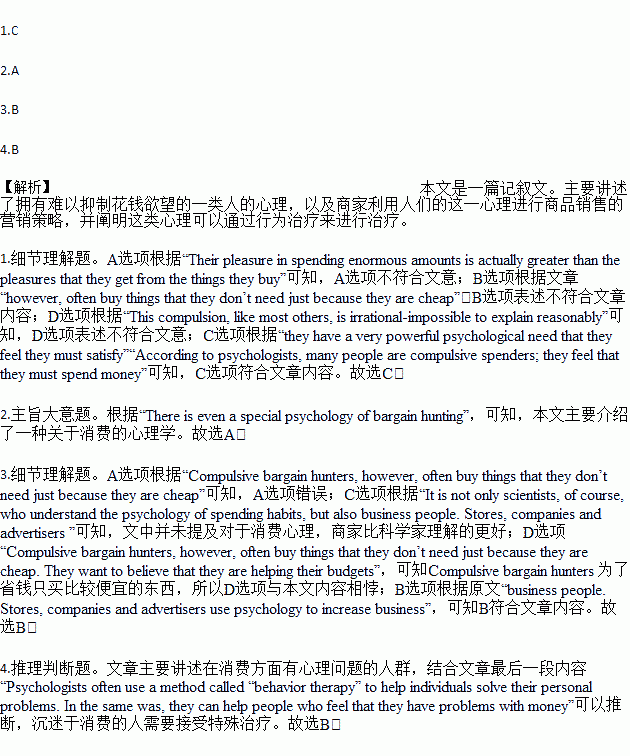题目内容
People can be addicted to different things, e.g. alcohol, drugs, certain foods, or even television. People who have such an addiction are compulsive, i.e they have a very powerful psychological need that they feel they must satisfy. According to psychologists, many people are compulsive spenders; they feel that they must spend money. This compulsion, like most others, is irrational-impossible to explain reasonably. For compulsive spenders who buy on credit, charge accounts are even more exciting than money. In other words, compulsive spenders feel that with credit, they can do anything. Their pleasure in spending enormous amounts is actually greater than the pleasures that they get from the things they buy.
There is even a special psychology of bargain hunting. To save money, of course, most people look for sales, low prices, and discounts. Compulsive bargain hunters, however, often buy things that they don’t need just because they are cheap. They want to believe that they are helping their budgets, but they are really playing an exciting game: when they can buy something for less than other people, they feel that they are winning. Most people, experts claim, have two reasons for their behavior: a good reason for the things that they do and the real reason.
It is not only scientists, of course, who understand the psychology of spending habits, but also business people. Stores, companies and advertisers use psychology to increase business: they consider people’s need for love, power, or influence, their basic values, their beliefs and opinions, and so on in their advertising and sales methods.
Psychologists often use a method called “behavior therapy” to help individuals solve their personal problems. In the same was, they can help people who feel that they have problems with money.
1.According to psychologists, a compulsive spender is one who spends large amounts of money ________.
A. and takes great pleasure from what he or she buys
B. in order to satisfy his or her basic needs in life
C. just to meet his or her strong psychological need
D. entirely with an irrational eagerness
2.The passage is mainly concerned with ________.
A. the psychology of money - spending habits
B. the purchasing habits of compulsive spenders
C. a special psychology of bargain hunting
D. the use of the psychology of spending habits in business
3.Which of the following statements is true?
A. All people spend money for exactly the same reason they need to buy things.
B. Business people and advertisers can use the psychology of money to increase sales.
C. Business people understand the psychology of compulsive buying better than scientists do.
D. Compulsive bargain hunters do not have problems with money.
4.From the passage we may safely concluded that compulsive spenders or compulsive bargain hunters ________.
A. are really unreasonable
B. need special treatment
C. are really beyond treatment
D. can never get any help to solve their problems with money
 黄冈经典趣味课堂系列答案
黄冈经典趣味课堂系列答案 启东小题作业本系列答案
启东小题作业本系列答案The most wonderful time of the year (the Christmas season) is also the most stressful for lots of people struggling to fit in increased end-of-the-year workloads, holiday parties, shopping, guest hosting, travel, and seeing friends and relatives who you’d otherwise avoid. Luckily, the same coping mechanisms that can help relieve stress and find better balance during the year also work for this holiday.
Here are four tips to finding work—life balance during this season.
1. Know and avoid your stressors(压力源).
If cooking for a large group, baking cookies, or Christmas shopping are your key stressors, don’t do them. Lots of grocery stores will help cater your next holiday meal. Bakeries exist for a reason, and gift cards are much appreciated by all. Stop trying to live up to someone else’s expectations of the holidays and stay merry by outsourcing the pain points.
2. Get flexible at work.
If you normally travel an hour each way at work, see if your boss will let you work from home in this special season to save time, get more done, and reduce your stress. Or ask if you can start work from home in the mornings and come to the office later in the day to avoid peak hours. Leave early and finish your day from the comfort of home, too.
3. Make your own list and check it twice.
Make a to-do list for yourself, for both work and life, then divide it up into categories like “must do,” “want to do,” and “feel obligated to do.” If you can remove any or all of your required list, the rest of your to-dos will start to look a lot easier.
Once you have your lists in order, it’s time to start crossing things off. In between your must-dos tasks, include a want-to-do task to break things up and re-energize yourself. Yes, this holiday is a time to give back to others and be selfless, but there’s still a bit of “self” in selflessness, isn’t there?
4. If you start to feel a cold coming on, come to a full and complete stop.
The best way to stop a cold from exploding into a weeks-long sickness is to stop it at the start. Unless a task or activity is an absolute necessity, cancel your plans, put away your to-do lists, and settle in for a long winter’s nap. A day of rest and enough sleep is the only thing you NEED right now. Feel bad about declining holiday invitations from your friends and family? You’re doing them a favor. Once people hear that you’re sick, they’ll be glad you stayed away — they don’t want to come down with a cold during the holiday any more than you do!
It is certain that you can feel less stressed in this hectic season when you stop expecting so much from yourself, because nobody puts so much expectation on you as you do to yourself. Trying to satisfy clients, co-workers, friends and family can be draining and can finally negatively impact you in many ways. When you simplify things up front, you relieve the stress off of yourself and everyone else in the process. Stop focusing on what you feel like you’re obligated to do, and start focusing on what you want and need to do, the load will get lighter and you will feel a lot merrier under the Christmas tree.
1. | Four Ways to Find Work-life Balance during the Christmas Season |
Introduction | ◆The Christmas 2. is often a time when work and social activities collide with each other. ◆Luckily, 3. relief mechanisms can be found to cope with the problem. |
Four Tips | ◆Your stressors like cooking, baking and shopping can be 4. because there is enough outsourcing for you to turn to and it is OK if you fail to live up to people’s 5.. ◆You can talk to your boss for a 6. schedule. ◆You can make a list of what really 7. and let go of the obligatory list. ◆Your friends and family don’t want to come 8. with a cold at all, so feel free to cancel all your plans when 9.. |
Conclusion | ◆Start 10. on what you want to do and you can enjoy the season better. |


 se around 6:30 am and usually comes home around 5:00 pm or even 6:00 pm. However, I want her to know that by becoming a doctor, it doesn’t mean I’ll be successful. I’d rather follow my dreams and create my own future.
se around 6:30 am and usually comes home around 5:00 pm or even 6:00 pm. However, I want her to know that by becoming a doctor, it doesn’t mean I’ll be successful. I’d rather follow my dreams and create my own future.